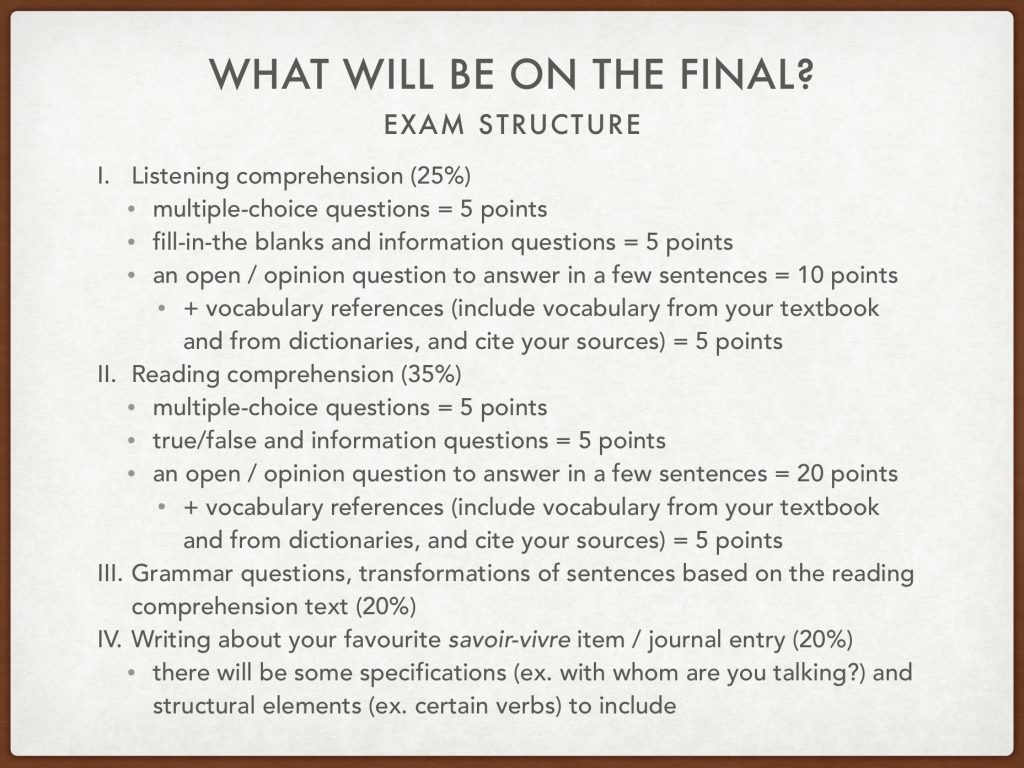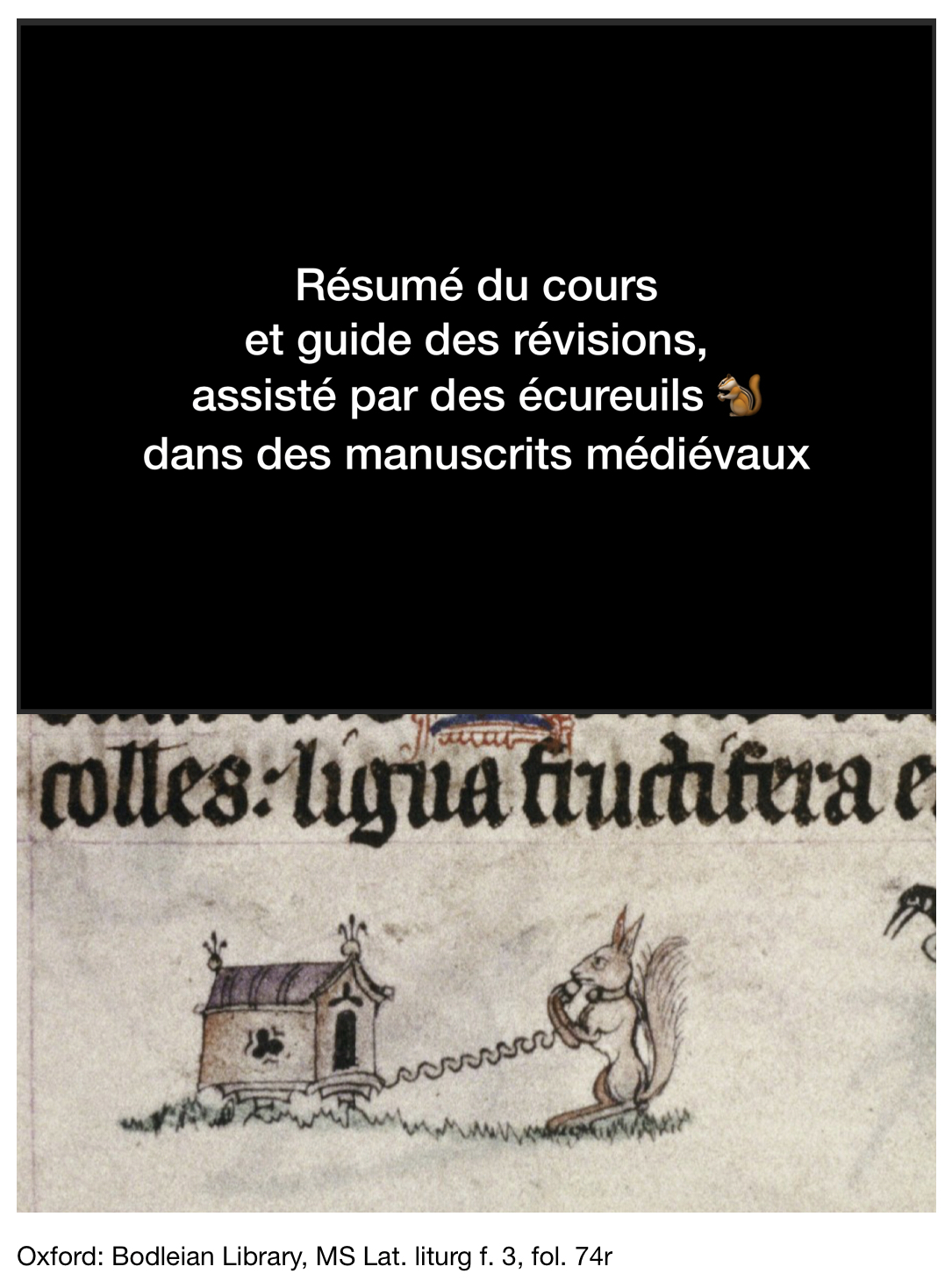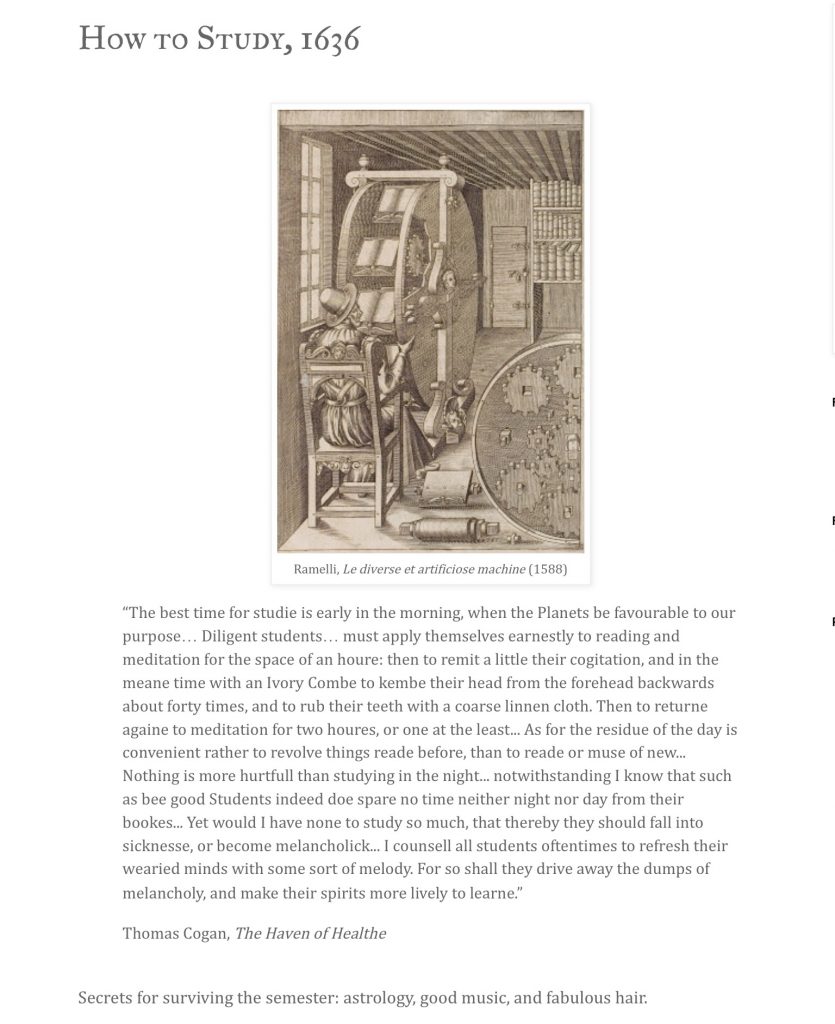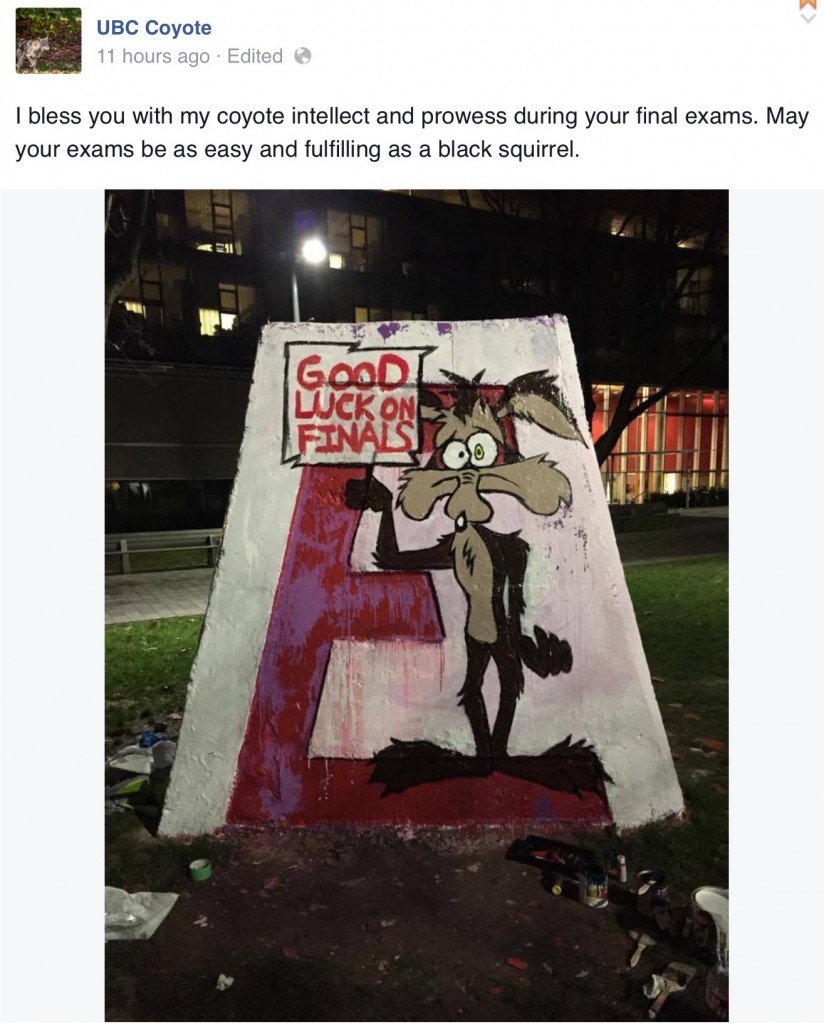 APRIL 2020 COVID-19 SPECIFICS
APRIL 2020 COVID-19 SPECIFICS
• The final exam is optional:
what this means and how it will work
• Exam structure, format, and special conditions:
remote, take-home, open for 24 hours, limited-open-book, honour code
EXAM REVISION GUIDES & GUIDANCE
• FREN 101 revision guide and practice exams
• FREN 102 revision guide and practice exams
• French and general exam preparation and revision guidance
• general exam season guidance
• general exam practicalities
Last updated: 22 April 2020
2020-04-10 UPDATE:
your final examination is OPTIONAL
Thank you for voting! The results are at https://ql.tc/ZSeIaK
Here is what happens next.
1 By Monday 20 April, your instructor should have informed you of your provisional grade so far, for all work that you have submitted by Tuesday 14 April.
- you can of course continue to submit work at least up until the day of the final exam
- there are no late penalties for overdue work: one of the major changes of the 2020-03-16 COVID-19 emergency syllabus
- dates might vary (and be later, after the final exam) for some instructors, check with your instructor—the person who teaches you in class—for their late amnesty / blanket extension / universal humane concession policy
2 Your exam will open on its scheduled day at 12 noon and close the next day at 12 noon. All of you will receive it, so that you can make an informed choice on whether or not to do it. Some instructors may be sending the exam to their students by email, some may be using Canvas; they’ll tell you what they’re doing.
- If you are in FREN 101 you will receive your exam on Friday 24 April at 12:00 noon, and it will be open until Saturday 25 April at 12:00 noon.
- If you are in FREN 102 you will receive your exam on Wednesday 22 April at 12:00 noon, and it will be open until Thursday 23 April at 12:00 noon.
3 The exam is optional. This means that you have two options—taking the exam or not taking the exam—and each of you, individually, can choose to do it, or not, in what I (O’Brien) hope is a free and flexible way:
- you could do the exam,
- you could not do the exam, ignore it completely,
- you could start and then decide not to finish and not to submit it,
- you could try it, do some of it, and submit that just in case,
- you can decide whether or not to do the exam (and therefore have it potentially count towards your final grade), and how much of it, at any point up to its end
- and you don’t need to tell your instructor, or me, whether you’re taking the exam or not: you can take your time thinking and deciding.
4 What happens next if you submit an exam?
= your instructor will mark those exams that had been submitted. And then …
- they will include the exam mark in calculating the final grade of each student who submitted an exam; the final grade will include all work submitted (at least) up to the day of the final exam (at least = see point (1) above)
- if including the exam in your final grade would raise your final grade, they will include it
- if including the exam would lower your grade, they will not include it
- so: you will receive whichever is the higher of
(a) your pre-exam 60% (= everything except the exam, on which see next point, (5) below) or
(b) your post-exam 100% (= 60% pre-exam work + 40% exam).
5 What happens next if you don’t submit an exam?
Or if you submit a final exam but its mark would lower your final grade?
= your instructor will not count it towards your final grade.
This means that, instead of giving you a 0 and then a maximum grade of 60% (if you had 100% on all the rest of your work for the class), your final grade would be based instead on the rest of your work for this class, without changing the proportionality of weighting on your syllabus (= each assignment’s mark would be x 10/6):
- the two tests
= originally 30% of your final grade
=> becomes 50 % - the project (or projects, some classes have more than one, some have a single project in stages)
= originally 15%
=> becomes 25 % - your cahier d’activités submissions
= originally 5%
=> becomes (25/3 =) 8-and-1/3 % - your savoir-vivre
= originally 10%
=> becomes (50/3 =) 16-and-2/3 %
6 We expect to be putting the finishing touches to final grades on Monday 4 May.
Final grades are expected to be published on Tuesday 5 May.
Once you have your final grade, you’ll have a week (until 13 May) to decide:
- whether to accept your assigned grade
- or to request (to Academic Advising in your home Faculty, ex. Arts) Credit/D/Fail standing
- or to apply (again, to Academic Advising) for withdrawal (“W”) from the course you can do that from now onwards too, but it is recommended that you wait until you have your final grade before deciding
This is meant to be a win-win situation for you. There are no traps. We are here to help, not hinder, you. If you’re not sure, if there’s anything that I haven’t covered in this information, if you still have “what if …” and “but what about …” questions: please email me, juliet.obrien@ubc.ca
EXAM FORMAT (FREN 101 & 102, April 2020)
SPECIAL REMOTE EXAM CONDITIONS (FREN 101 & 102, April 2020)
Your final examination will be:
- a remote take-home exam
- to be completed in two and half hours (with extra time for students registered with Accessibility)
- open for 24 hours, around the time of the scheduled exam
(opens at 12 noon—scheduled time 19:00-21:30—closes next day at 12 noon) - limited open-book
- honour code
Please read these slides for detailed information and instructions:
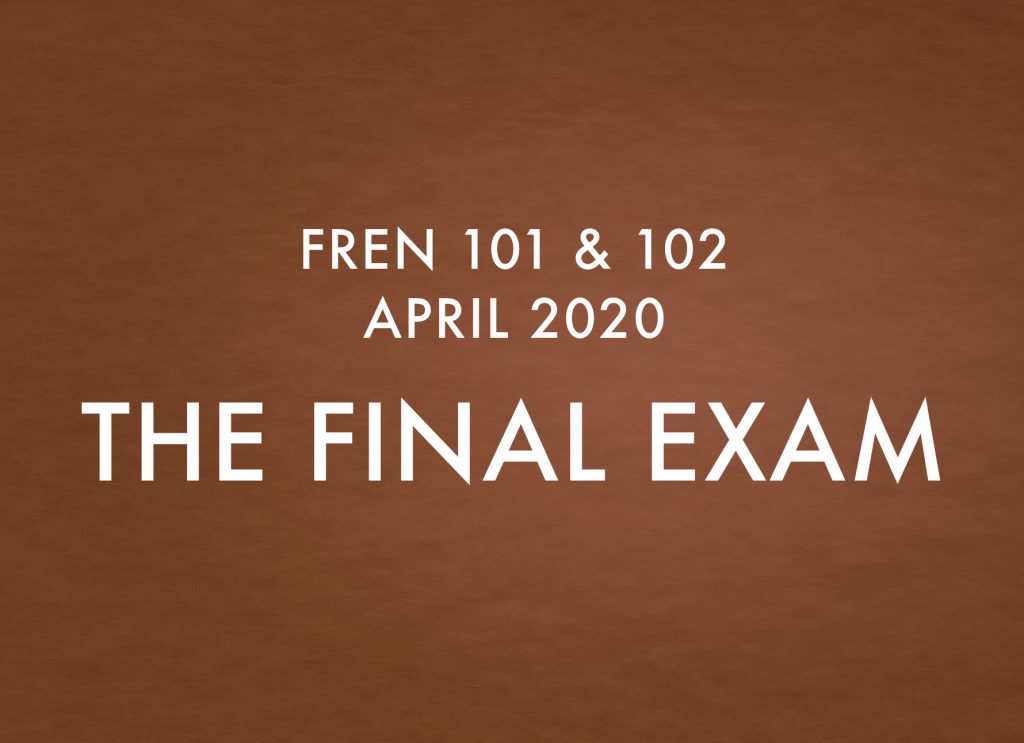
HONOUR CODE
(= the exact version in your exam booklet)
ADDITIONAL EXAMINATION RULES AND DIRECTIONS
= in addition to UBC Vancouver Academic Calendar > Campus-Wide Policies and Regulations > Academic Assessment > Student Conduct during Examinations
This is an honour-code limited-open-book take-home exam. Before you start, please read this page attentively then read the HONOUR CODE at the end of the next page and sign your name (typing/writing it is fine) and write the date. An exam that is submitted without a signed and dated formal honour code statement will automatically receive a 0.
You MAY use:
- your textbook and workbook
- shared course materials on this course’s Canvas site
- your own notes from this class
- one of the specific approved online dictionaries: Lexilogos, Linguee, or Wordreference
- help from our teaching team: I (the coordinator) will respond to emails (juliet.obrien@ubc.ca) 08:00-22:00; other instructors will inform you of their availabilty. Ask me anything. I will probably be able to answer, or at least give you a clue. During the exam, instead of working as surveillance of you, we’re going to be working as support for you.
As this exam is independent individual work, you are honour-bound NOT to communicate with anyone (other than the coordinator and your instructor in this course) until you have finished and submitted the exam: that means no communication of any sort and in any medium.
As members of this academic community, we should act according to the same code of honour, where we take responsibility for our personal behavior, respect others, nurture independent thought, and abide by the standards of academic integrity embraced by UBC and as is expressed in our course syllabus in both in person and online learning environments. For this specific assessment, we hope that you will respect the guidelines. We trust you.
In accordance with the UBC Respectful Environment Statement, I will treat you as a moral agent and responsible adult, and hold you to the same standards as I do my faculty colleagues and indeed as I hold myself: we are fellow Members of the University.
I will assume, and presume, that you are a person of honour.
HONOUR CODE
I pledge my word as my bond and promise on my honour as a Member of our University that:
- this is my own individual work;
- I have done this work alone and independently;
- I understand that I may ask my instructor and/or the coordinator questions during the exam;
- I have not communicated information about the examination to or received any information from anyone else;
- I have not contacted, communicated with, or received assistance from other examination candidates, students, friends, family, neighbours, tutors, online services, exam upload sites, crowdsourcing, Reddit, or any other person or agency or entity;
- I have not consulted or used any unauthorised materials: automated translation, translation engines, verb conjugators, and spell-checking and grammar-checking software;
- the only materials that I have accessed are those that are permitted: our course materials, course materials on our Canvas course site, my own course notes, and an approved online dictionary (Lexilogos, Linguee, Wordreference).
Name: _____________________________________
Student number: ________________
Signed: _____________________________________
Date: __________________________
NAVIGATION:
EXAM REVISION GUIDES & GUIDANCE
- FREN 101 revision guide
- FREN 102 revision guide
- exam preparation and revision guidance
- exam season guidance
- exam practicalities

FREN 101 REVISION GUIDE
- The final exam is cumulative, on everything in FREN 101
- Model / format: CEFR level A1.1
- Listening comprehension, reading comprehension, + writing
PRACTICE MATERIALS
- Cosmopolite 1 : Livre de l’élève (textbook), sample DELF A1 questions, “Compréhension de l’oral,” “Compréhension des écrits” + “Production écrite”; p. 35, 53, 71, 89, 197-200.
- Cosmopolite 1 : Cahier d’activités (workbook), sample DELF A1 questions, “Compréhension de l’oral” #1-4, “Compréhension des écrits” #2 & 4 + “Production écrite” #1-2; p. 122-127.
- Cahier d’activités, “BILAN” sections at the end of each dossier, “Compréhension de l’oral,” “Compréhension des écrits” + “Production écrite” questions; p. 16-17, 30-31, 44-45, 58-59.
- Practice exam: slightly different from the April 2020 exam which is an honour-code semi-open-book remote take-home exam:
- December 2019: practice exam (PDF) and practice exam with answers
- (no listening comprehension) practice exam: December 2018and a corrected version / sample answer key
- Listening comprehension on the exam: ONE exercise only. You will be provided with an audio track to play three times, with pauses between:
- there will be a first set of questions of an introductory general nature, to answer during and after the first listen;
- a second set of questions, more detailed, to answer during and after the second listen;
- and you can play the audio a third time a few minutes later, so that you can check your answers.
- The audio track will be one of those in Cosmopolite 1 textbook and workbook, dossiers 1-4: you can practice by listening to all of them!
O’BRIEN OLD REVISION CLASS NOTES (29 November 2018)
Pink Martini, “Sympathique (je ne veux pas travailler)” includes “hooks” for all the grammar of FREN 101 and sneak previews of 102.
Lyrics: https://genius.com/Pink-martini-je-ne-veux-pas-travailler-lyrics
Read about Pink Martini in French: https://fr.m.wikipedia.org/wiki/Pink_Martini
In a last connection to the French poet the centenary of whose death has been haunting our course in the background, this song remixes and continues the Guillaume Apollinaire poem “Hôtel” (in his posthumous collection (1952) Le Guetteur mélancholique.)
Ma chambre a la forme d’une cage,
Le soleil passe son bras par la fenêtre.
Mais moi qui veux fumer pour faire des mirages
J’allume au feu du jour ma cigarette.
Je ne veux pas travailler — je veux fumer.
OLD REVISION MATERIALS (2015-18)
NOTE: the format of the course has changed, as has the form and content of the final examination. Many of the exercises in the old FREN 101 exams, however, are still useful:
- reading comprehension
- nouns and adjectives and their agreement
- sentences using -ER verbs in the present, as well as ÊTRE, AVOIR, ALLER, PRENDRE, VENIR
- sentences using conjugated verbs like AIMER + another verb in the infinitive, to talk about activities, preferences, tastes, and opinions
- demonstrative and possessive adjectives (déterminants)
- negation
- asking questions
- talking about space (prepositions of relative location etc.)
- talking about time (adverbs, numbers and other vocabulary)
(Some exercises are not: for example, the old 101 exercises on the futur immédiat.)
FREN 101 EVEN OLDER PAST EXAMS FOR PRACTICE
- practice exam: December 2017 + a corrected version / sample answer key (including marking guidance comments for instructors, in French; PDF)
- practice exam: December 2016 + answers
- practice exam: December 2015 + answers
- please note that exam content varies, so you may find one grammar point appears in an exam one year or term but not another. Anything worked on in class (or in your other work–projets, savoir-vivre, etc.) but not covered specifically elsewhere in the exam may of course be used in your writing.
FREN 102 OLD EXAMS
I’m also including old FREN 102 exams here, because 101 covered some of the grammar that appears there:
- some more verbs in the present: FAIRE, LIRE, ÉCRIRE, VOULOIR, POUVOIR, DEVOIR, CHOISIR, SORTIR
- reflexive & reciprocal verbs (les verbes pronominaux) in the present
(Ignore the rest of the material in the old 102 exams: past tenses, more pronouns, etc.)
- practice exam: April 2018 + corrected version / sample answer key (including marking guidance comments for instructors, in French)
- practice exam: April 2017 + answers
- practice exam: April 2016 + answers
FREN 102 REVISION GUIDE
- The final exam is cumulative, on everything in FREN 102
- Model / format: CEFR level A1
- Listening comprehension, reading comprehension, + writing
PRACTICE MATERIALS
- Cosmopolite 1 : Livre de l’élève (textbook), sample DELF A1 questions, “Compréhension de l’oral,” “Compréhension des écrits,” + “Production écrite”; p. 107, 125, 143, 161
- Cosmopolite 1 : Cahier d’activités (workbook), sample DELF A1 questions, “Compréhension de l’oral,” “Compréhension des écrits,” + “Production écrite”; p. 122-127.
- Cahier d’activités, “BILAN” sections at the end of each dossier, “Compréhension de l’oral,” “Compréhension des écrits,” + “Production écrite” questions; p. 72-73, 86-87, 100-101, 114-115.
- Practice exam: slightly different from the April 2020 exam which has a listening comprehension and is an honour-code semi-open-book remote take-home exam:
- April 2019: practice exam (PDF) and practice exam with answers
- Listening comprehension on the exam: ONE exercise only. You will be provided with an audio track to play three times, with pauses between:
- there will be a first set of questions of an introductory general nature, to answer during and after the first listen;
- a second set of questions, more detailed, to answer during and after the second listen;
- and you can play the audio a third time a few minutes later, so that you can check your answers.
- The audio track will be one of those in Cosmopolite 1 textbook and workbook, dossiers 5-8: you can practice by listening to all of them!
O’BRIEN OLD REVISION CLASS NOTES (3 April 2019)
OLD REVISION MATERIALS (2015-18)
NOTE: the format of the course has changed, as has the form and content of the final examination. Many of the exercises in the old FREN 101 and 102 exams, however, are still useful:
- reading comprehension
- talking about preferences, tastes, and opinions
- descriptive adjectives / les adjectifs qualificatifs
- past tenses: passé récent, passé composé, imparfait
- the future: futur proche, futur simple
- pronouns: les pronoms personnels et relatifs
- vocabulary
FREN 101 OLD EXAMS
- practice exam: December 2017 + a corrected version / sample answer key (including marking guidance comments for instructors, in French; PDF)
- practice exam: December 2016 + answers
- practice exam: December 2015 + answers
- please note that exam content varies, so you may find one grammar point appears in an exam one year or term but not another. Anything worked on in class (or in your other work–projets, savoir-vivre, etc.) but not covered specifically elsewhere in the exam may of course be used in your writing.
FREN 102 OLD EXAMS
- practice exam: April 2018 + corrected version / sample answer key (including marking guidance comments for instructors, in French)
- practice exam: April 2017 + answers
- practice exam: April 2016 + answers
EXAM PREPARATION AND REVISION GUIDANCE
The good news about FREN 101 & 102 exams is that you should not have any revision to do; and none of the sorts of “studying”—as contrasted with learning—that are needed in some other kinds of course and academic field.
French is a language; and language-learning is more like music or sport than, say, biology or economics. Language-learning is cumulative—with new knowledge building on previous acquisitions—and happens and is reinforced through regular practice. If you have been to class, worked in class, and worked on your practice exercises outside class—ideally, doing some French every day—then you will have been learning all term and should be well prepared for quizzes, tests, and exams in FREN 101 & 102.

DORMIR est le verbe le plus important en français (nos 2-10 = RÊVER, RÊVASSER, SONGER, IMAGINER, FLÂNER, FAINÉANTER, SE PROMENER, VAGUER, VAGABONDER…)
Here are some useful practical general tips and advice from Timothy Gowers (Mathematics, University of Cambridge) > scroll down to “General study advice.”
What more can you do?
1. Sleep.
At least 8 hours/night, every night. Sleep plays an essential role in deep learning and the consolidation of memory.
2. Electronic visual blackout before sleep.
At least an hour with no electronic light-sources (i.e. screens). This can also help you to sleep. Listening to music, however, is actively encouraged: especially if it’s in French! Music can also be calming and comforting.
3. Eat well and regularly.
4. Exercise.
Including during the day, outside, in the fresh air and light.
While working, make sure you’ve at least stretched for 5 minutes every hour. This keeps your core muscles limber and your airways open; especially around your upper torso and shoulders. During an exam too: we will remind students of the passing of time during the exam, and one reason for that is to give us a reason to remind students to stretch out a bit.
5. Prepare, intelligently. (See video above, which reformulates much of the information below.)
Work on the Cahier d’activités exercises.
Work in shorter intensive stretches (maximum 20 to 30 minutes), with regular breaks. Set an alarm or a timer, to ensure that you have a break for at least 5-10 minutes every hour.
Read, watch, and listen to some French every day: even 5 minutes of skim-reading newspaper headlines online. Any French, from any Francophone place, on any subject. This is also a good excuse to watch a movie in French (in French, preferably with sub-titles in French too).
Ó Brien, “Tips for learning” (PDF, 2018):
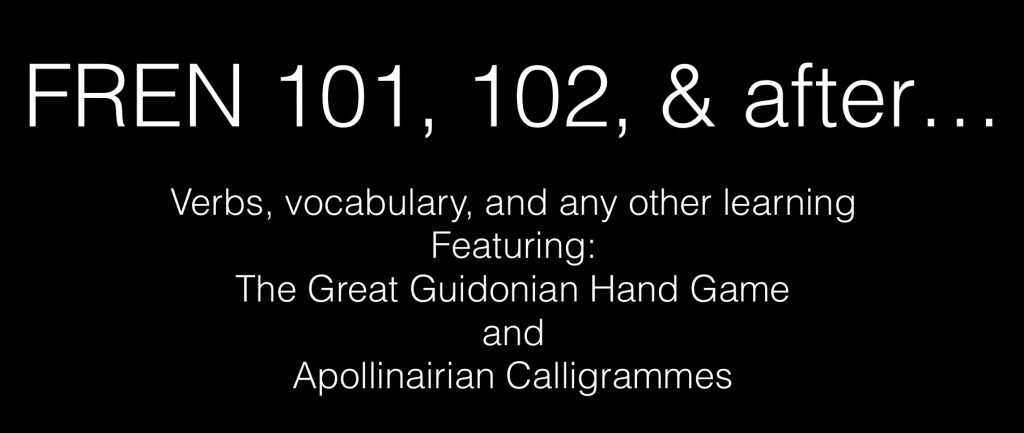
Doing a mini-immersion in French is the single best thing that you can do immediately before our French exam: listen to and/or watch some French the evening before your exam, read some French in the morning, and then give your beautiful mind a rest to help it to be ready for the exam.
Cramming at the last minute is not advised, for three reasons:
(a) Most of your work is done during term, in the virtuous cycle of teaching-and-learning. This is reinforced by FREN101 and 102 practice exercises (Cahier d’activités). There is little material that you can cram at the last minute, without taking drugs of a sort that also risk messing up memory. French is unlike academic areas that depend on learning facts by heart, by rote, in a mechanical robotic way.
(b)French is like most other academic subjects in that, at a university level, in order to do well you will/should also need to show evidence of reflexion, of independent thought; of applied knowledge. This entails active new thinking during the exam.
(c) French, like any language, requires regular continuous work and practice. The way it is learned is more like music than is is like other Arts/Humanities subjects. An analogy: if you had a piano recital, you wouldn’t do nothing at all and then cram 18 hours’ practice the day before.
6. Some of the best revision you can do before tests and exams is testing yourself. One of the best tests of your knowledge is your capability to explain something to another person. Work in study-pairs or groups (but keep them small: 2-4 people). Meet regularly over coffee/tea (and maybe cake, du gâteau). Quiz each other. This can be done at any time, and continues to be beneficial in the week before a final exam. (April 2020 COVID-19 UPDATE: and virtual equivalents, online.)
7. Make sure you know where your exam is taking place, how to get to it, and how long that will take.
8. Make sure you know where the nearest bathroom is. Pay a visit before the exam.
9. Arrive at your exam early (at least 20 minutes before the start), preferably including at least 10 minutes’ walking in your itinerary to get some oxygen into your brain (but not running).
10. Don’t bring anything with you that you don’t need for the exam itself. Especially no notes, revision guides, textbook, etc. They rarely-to-never help. They often hinder. The best way to use those last few minutes before the exam: doing deep breathing. Some people meditate. Do whatever works for you, something calm that involves breathing slowly and deeply, good for your heart-rate as well as your blood (and brain) oxygen levels.
EXAM SEASON GUIDANCE
UBC resources for stress-relief for students:
- Stress: http://students.ubc.ca/livewell/topics/stress
- Anxiety: http://students.ubc.ca/livewell/topics/anxiety
- Sleep: http://students.ubc.ca/livewell/topics/sleep (I cannot over-emphasise the importance of sleep, for general health as well as for brains & exams; UBC and research colleagues in psychology and neuroscience do too. It’s not just me.)
- Nutrition: http://students.ubc.ca/livewell/topics/nutrition-and-food
- Physical activity and recreation: http://students.ubc.ca/livewell/topics/physical-activity-and-recreation
Events on campus: http://students.ubc.ca/success/stress-less-exam-success- UBC Student Services have good advice (I say “good” as it echoes what I’ve been telling students since 2001) for students taking UBC final exams for the first time: https://students.ubc.ca/ubclife/what-expect-first-finals-season
- “(tutoring and) studying”
- > learning & memory
- “student toolkits”
- > “preparing for exams”
Arts Peer Academic Coaching: APAC’s coaching hours are hosted in the Meekison Arts Student Space in Buchanan D140 (down the hall from Arts Academic Advising). There are two ways to meet with a coach:
Drop-in hours: Come by between 11 a.m. and 3 p.m. Tuesdays, Wednesdays, & Thursdays throughout the term.Book an appointment in advance.
Great news – peer coaching is free! Come on your own, or bring a friend. Come by once, or several times to meet some of the different coaches on the team.
LOCAL WELLBEING RESOURCES: PHYSICAL AND SENSORY ENVIRONMENT
O’Brien personal recommendations on and near campus follow next. All are free to access; some will sound familiar from FREN 101 and 102 projects … and yes, integrating wellbeing into your work for these courses was deliberate; I hope that it helps!
- Beaches, especially in winter: Acadia, Jericho, Spanish Banks, etc.
- H.R. MacMillan Space Centre (1100 Chestnut Street, by Vanier Park): http://www.spacecentre.ca
- Pacific Spirit Park
- UBC Beaty Biodiversity Museum, inc. blue whale skeleton (free for UBC students): https://beatymuseum.ubc.ca
- UBC Belkin Art Gallery (free for UBC students): http://www.belkin.ubc.ca
- UBC Botanical Garden and Nitobe Memorial Garden (free for UBC students): http://botanicalgarden.ubc.ca
- UBC Koerner (Arts & Humanities) Library: https://koerner.library.ubc.ca
- UBC Museum of Anthropology / world arts and cultures (free for UBC students): https://moa.ubc.ca
- UBC Rare Books and Special Collections: https://rbsc.library.ubc.ca
- UBC School of Music concerts; many are free or cheap, often in the daytime, and include student recitals: https://music.ubc.ca/calendar/
- Vancouver Public Library, especially the Central Library (350 West Georgia Street): https://www.vpl.ca
- Volunteer (and learn) at UBC Farm: http://ubcfarm.ubc.ca/get-involved/volunteer-program/
EXAM PRACTICALITIES
WHEN & WHERE?
- See UBC personalised exam schedule by logging in to the SSC
- April 2020: your exam is online. You will be able to do it at the scheduled time, or earlier (from 12 noon that day) or later (until 12 noon the next day), it’s open for 24 hours
- you can do the exam anywhere!
WHAT YOU SHOULD BRING WITH YOU
- your UBC student ID
- a pen and/or pencil (I would recommend bringing three new ones that you’ve already tested out)
- water, if you wish
- a spare layer of clothing in case you get cold during the exam (cardigan, hat, etc.)
basics such as keys, outerwear, umbrella, …- April 2020 update:
- AND your textbook, workbook, course notes
- AND a laptop or tablet
- AND materials on your Canvas course site and course notes there
- AND any other drinks, snacks, etc.
- AND any/all of the following good free online dictionaries and dictionary databases: Lexilogos, Linguee, WordReference
WHAT YOU COULD BRING WITH YOU (OPTIONAL and not for use during the exam)
one index card of notes
NB: No notes or books or materials are allowed in the exam itself (as should be clear from the exam format, practice exams, etc.). This is an exam preparation suggestion only for those students who find it worrying to have nothing with them and feel reassured to have something to look at as last-minute revision. Doing that using one pre-prepared index card is better (and writing that index card is very good preparation in its own right) than bringing all of your notes, textbook, workbook, etc. with you.
WHAT YOU DO NOT NEED TO BRING WITH YOU
textbooks, notes, revision materialscellphones, smartphones, tablets, laptops, headphones, and other electronic devices- I usually recommend not bringing or using tippex / wite-out / liquid paper or erasers: in exams like ours, where you are actually writing rather than filling out scannable forms, it is better to strike through an answer that you think is wrong and then return to it when you are proofreading and editing, so that you can see your own thinking and working in such areas of uncertainty and pick up your thought where you left off before moving on to the next question. It’s possible that an earlier answer was right, and if you’ve erased it, you’ll have lost it. Also, when I am marking, I can give you at least partial marks if I can see your working, including a previous correct answer.
UBC RULES ABOUT EXAMINATIONS
You are expected to know these: it is one of your contractual responsibilities and obligations when you registered as a UBC student.
- student declaration and responsibilities
- academic honesty and standards
- student conduct and discipline
- academic misconduct: cheating, plagiarism, etc.
- student conduct during examinations
- exam policies and accommodations
- UBC grading practices
- UBC Policies and Regulations: Academic Concession
SEE ALSO
- Syllabus (2): THE RULES > Missing or rescheduling tests and examinations
- Syllabus (3): HELP

Image en haut de la page : Rome, le 7 juin 2002. Folon devant les vestiges d’une statue aux Musées du Capitole. © Luciano del Castillo
